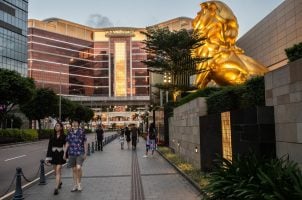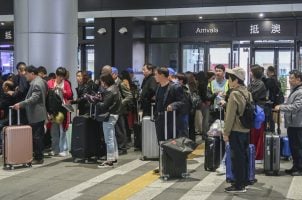China Travel Booking Site Says Outbound Tourism Recovery Ongoing
Posted on: November 23, 2023, 01:32h.
Last updated on: November 23, 2023, 11:21h.
Trip.com, a leading online travel booking website in China, reports that outbound tourism from the mainland continues to recover in the aftermath of the COVID-19 pandemic.

In its third-quarter earnings report, Trip.com reported net revenue of approximately RMB13.7 billion ($1.9 billion), nearly double from the July through September period in 2022. The 2023 Q3 revenue also represents a 31% increase from 2019, as room rates and airfare prices have skyrocketed.
Throughout the third quarter, both domestic and international travel experienced a remarkable rebound, thanks to the robust summer travel demands. This shows just how eager travelers are to explore the world,” James Liang, Trip.com’s executive chairman, said on the earnings call.
Trip.com CEO Jane Sun added that the company continues to see outbound travel from China recover.
Normal life in China remained on hold until late last year, when China President Xi Jinping finally lifted his “zero-COVID” policy. The program had ordered lockdowns and travel restrictions across the world’s second-most populated country.
Macau Top Destination
Trip.com Group Limited was acquired in 2017 by Ctrip.com International. The reverse takeover resulted in Ctrip assuming the Trip.com identity. The corporation is headquartered in Shanghai.
Outbound tourism refers to mainland Chinese people crossing the People’s Republic’s borders into another country, or to one of China’s two Special Administrative Regions (SARs) in Hong Kong and Macau.
Trip.com’s quarterly report showed that outbound hotel and air reservations have recovered to about 80% of their pre-pandemic 2019 conditions. Overall outbound traffic, inclusive of automobile, water, and rail travel, has only recovered to about 50%.
In the aftermath of the coronavirus, Trip.com officials say Macau has emerged as the most popular destination among Chinese travelers. Hong Kong previously held that distinction.
Outbound travel is rapidly recovering thanks to improvements in international airlift and travelers’ robust desire for international experience,” Liang detailed. “We anticipate continuously strong demand for outbound travel in the coming year and are committed to enhancing our partner offerings to meet this demand.”
One such Trip.com partnership is with the Macau government. In April, the Macau Government Tourism Office (MGTO) announced it was expanding its marketing agreement with Trip.com with additional incentives, such as discounted hotel rates.
Macau Overhaul
Macau is trying to appeal to a wider range of potential visitors by diversifying its leisure market away from casino gambling. When the Macau SAR Government issued its six casino operators new 10-year gaming licenses last December, the casinos agreed to invest a minimum of $13.5 billion in nongaming projects by 2033.
The resorts are expected to use the required capital to update their rooms and bring new attractions to the enclave, including additional theme parks, sports facilities, convention space, business capabilities, and health and wellness services.
Sands China, the Asian subsidiary of Las Vegas Sands, must invest at least $3.46 billion in nongaming during its 10-year gaming license. Galaxy Entertainment’s nongaming allotment is $3.42 billion, while Wynn China must invest $2.05 billion, MGM China $1.87 billion, SJM Resorts $1.5 billion, and Melco Resorts $1.24 billion.
Related News Articles
China Delays Group Tours Amid COVID-19 Spread, Macau Again Tightens Border
Most Popular
Mirage Las Vegas Demolition to Start Next Week, Atrium a Goner
Where All the Mirage Relics Will Go
Most Commented
-
Bally’s Facing Five Months of Daily Demolition for Chicago Casino
— June 18, 2024 — 12 Comments
















No comments yet